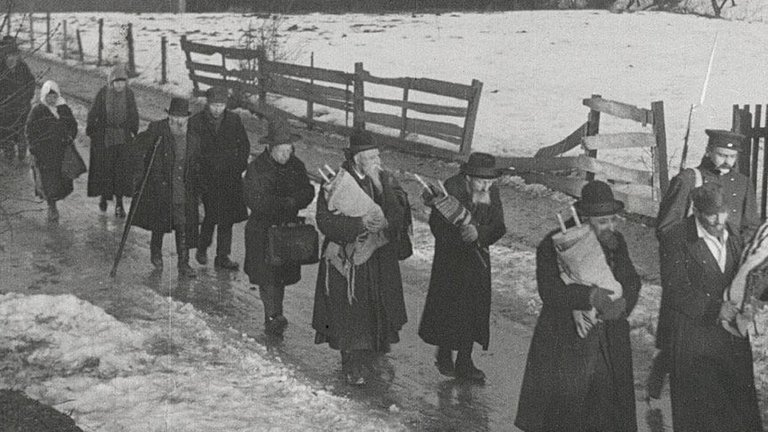Film Review: The City Without Jews (Die Stadt ohne Juden, 1924)

One of the most macabre ironies of 20th Century is that the piece of cinema that can be described as the first Holocaust film was produced long time before the actual Holocaust. And even more macabre irony is that the film is, or at least was supposed to be, a satirical comedy. That film is The City Without Jews, 1924 Austrian silent film directed by Hans Karl Breslauer.
The film is based on the eponymous novel by Hugo Bettauer, inspired by troubled post-WW1 years of his native Austria, country which has lost the empire in the war and suddenly became impoverished, with traditional anti-Semitism quickly finding Jewish minority as the reason for all the country’s trouble. The script, co-written by Breslauer and Ida Jenbach, has changed the setting into fictional “Republic of Utopia”. Country is turmoil, beset by labour protests and collapse of national currency. Government led by Federal Chancellor (played by Eugen Neufeld), goaded by right-wing Pan German councilmen like Bernart (played by Hans Moser) concludes that the popular discontent could be removed if the entire Jewish population is expelled from country by Christmas. The decree, which involves even children from mixed marriages, is brutally enforced, with people chased from their homes, many of them taking trains to bring them to faraway places like Paris, Hamburg or “Zion”. Country, on the other hand, soon learns that it can’t properly function without its creative and talented Jewish population, including fashion designers without which textile industry collapses. Further problem are international boycotts and refusal of foreign banks to give necessary loans to Utopia. In the meantime, Leo Strakosch (played by Johannes Riemann), one of the deported Jews returns under false identity of French painter in order to reunite with his fiancee Lotte (played by Anny Miletty), but also uses opportunity to publish pamphlets by “Union of the Authentic Christians” advocating the repeal of the decree. As the economic pressure mounts, Chancellor relents but the repeal is still one vote short of necessary majority. Strakosch solves that problem by making councilman Bernart drunk and miss his vote.
Hugo Bettauer was prolific and controversial author known for his liberal views whose best known work is Joyless Street, bestselling novel that would in 1925 serve as basis for eponymous film, one of the classics of silent era which launched Greta Garbo into international stardom. Compared with it, The City Without Jews is much more obscure film. This might be explained with Breslauer being not too inspired or talented film maker, at least compared with true masters of the silent era. Editing is chaotic and the plot, made of various vignettes, confusing so the audience would, despite intertitles, need to be pay extra attention to realise what is really going on. There are bits and pieces that are interesting, like the scenes of expulsion that seems strangely prescient or one of the scenes near the end, when Bernart ends in mental asylum surrounded by visions of Stars of David and Expressionist scenery clearly inspired by The Cabinet of Dr. Caligari. The acting is, just like in most silent films, overly theatrical but Riemann and Miletty (who would later become Breslauer’s wife) provide best performance, partly because the romantic subplot is the most coherent part of the film and partly because they, unlike other members of the cast, don’t use excessive make up. Probably the biggest problem of the film is that, in some ways, actually uses some of the tropes of anti-Semitic propaganda by showing international Jewish bankers conspiring against sovereign states and having a single Jew thwarting democratic process through deception.
One of the fiercest critics of the film was Bettauer. He was furious over the changes to source material, mainly its dark satirical tone being replaced with broader comedy and the film’s message – that even the most enlightened and progressive countries might succumb to medieval, absurd and self-defeating levels of bigotry – being muddled with ultra-happy ending that explains all events as a bad dream of Bernart who, after waking up, learns the errors of his ways. The real history didn’t provide happy ending and Bettauer was one of the first to find out, being assassinated year after premiere by fanatical supporter of emerging National Socialist Party. Breslauer, perhaps seeing that even watered down political satire can cause too much trouble, effectively ended his film making career and switched to literature, even becoming member of Nazi Party after Anschluss (like Riemann, who also became Nazi despite playing the Jewish hero in the film). His co-writer Ida Jenbach, fared much worse and, as a Jew, disappeared after being “transported to East” during the Final Solution. The City Without Jews almost had the same fate. Uncomfortable to those who have seen it, dangerous for many who made them during Nazi rule over Austria and deeply unpleasant after comparing its fiction with much darker real life, it was considered lost until 1991. Its rediscovery was followed by years of restoration and the more or less complete version became available only in 2015.
RATING: 5/10 (++)
Blog in Croatian https://draxblog.com
Blog in English https://draxreview.wordpress.com/
Leofinance blog https://leofinance.io/@drax.leo
Unstoppable Domains: https://unstoppabledomains.com/?ref=3fc23fc42c1b417
Hiveonboard: https://hiveonboard.com?ref=drax
Bitcoin Lightning HIVE donations: https://v4v.app/v1/lnurlp/qrcode/drax
Rising Star game: https://www.risingstargame.com?referrer=drax
1Inch: https://1inch.exchange/#/r/0x83823d8CCB74F828148258BB4457642124b1328e
BTC donations: 1EWxiMiP6iiG9rger3NuUSd6HByaxQWafG
ETH donations: 0xB305F144323b99e6f8b1d66f5D7DE78B498C32A7
